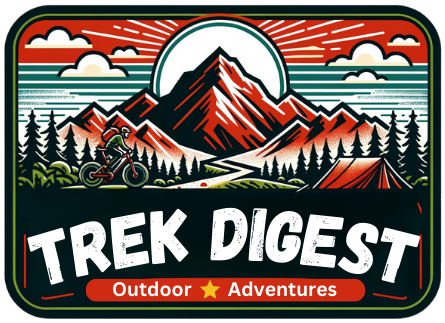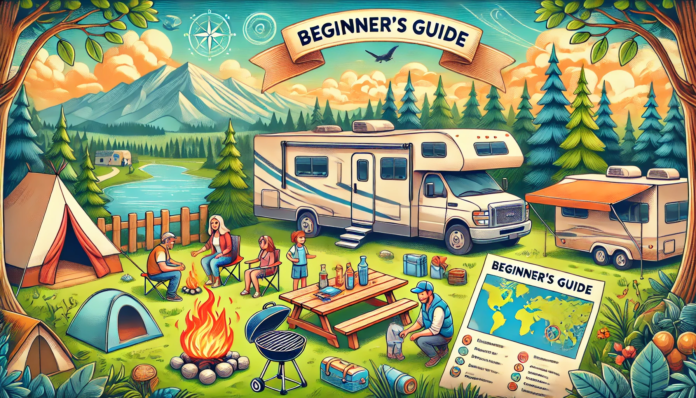If you’re looking to hit the open road and explore the great outdoors, RV camping might be the perfect activity for you. RV camping allows you to travel comfortably while experiencing all the beauty that nature has to offer. However, if you’re new to RV camping, it can be overwhelming to know where to start.
Luckily, this beginner’s guide to RV camping will provide you with all the information you need to know to get started. From choosing the right RV to finding the perfect campsite, we’ll cover everything you need to know to make your first RV camping trip a success. So, pack your bags and get ready to hit the open road!
Choosing the Right RV
When it comes to RV camping, choosing the right RV is crucial to ensure a comfortable and enjoyable trip. Here are some factors to consider when choosing the right RV for your needs:
Types of RVs
There are several types of RVs to choose from, each with its own advantages and disadvantages. The most common types of RVs are:
- Class A: These are the largest and most luxurious RVs, often equipped with full-size appliances, multiple bedrooms, and bathrooms. They are ideal for long-term trips and large families.
- Class B: Also known as camper vans, these are smaller and more maneuverable than Class A RVs. They are perfect for couples or small families who want to travel light.
- Class C: These are mid-sized RVs that offer many of the same amenities as Class A RVs, but are more affordable and easier to drive. They are great for families or groups of friends who want to travel together.
New vs. Used RVs
Another factor to consider when choosing the right RV is whether to buy new or used. New RVs come with the latest features and technology, but can be expensive. Used RVs are more affordable, but may require more maintenance and repairs.
If you decide to buy a used RV, make sure to inspect it thoroughly and ask for maintenance records to ensure it has been well-maintained.
Budget Considerations
RVs come in a wide range of prices, from a few thousand dollars for a used camper van to hundreds of thousands of dollars for a new Class A RV. You should set a budget before you start shopping for an RV and stick to it.
Keep in mind that the cost of an RV is not the only expense to consider. You will also need to factor in the cost of gas, insurance, maintenance, and campground fees.
By considering these factors, you can choose the right RV for your needs and budget, and enjoy a comfortable and memorable RV camping experience.
RV Camping Essentials
Embarking on an RV camping trip can be an exciting adventure, but it’s important to make sure you have all the necessary essentials before hitting the road. In this section, we’ll cover some of the most important items you’ll need to pack, as well as some tips for understanding RV systems, setting up camp, and maintaining safety.
Packing Your RV
When it comes to packing your RV, it’s important to be organized and efficient. Make a list of everything you’ll need for your trip, including food, clothing, bedding, and any other essentials. Consider the size and weight of each item and try to pack as lightly as possible.
One helpful tip is to use storage containers and packing cubes to help keep your items organized and easily accessible. You may also want to invest in some RV-specific gear, such as collapsible chairs, outdoor rugs, and awnings, to make your campsite more comfortable.
Understanding RV Systems
Before hitting the road, it’s important to have a basic understanding of your RV’s systems, including the electrical, plumbing, and HVAC systems. Make sure you know how to operate each system and how to troubleshoot common problems.
It’s also a good idea to have a basic tool kit on hand, including items such as a tire pressure gauge, screwdrivers, pliers, and duct tape. This will allow you to make minor repairs and adjustments as needed.
Campsite Setup
Setting up camp can be a fun and rewarding experience, but it’s important to do it safely and efficiently. When choosing a campsite, make sure it’s level and stable, and avoid parking on soft or uneven ground.
Once you’ve parked your RV, it’s time to set up camp. This may include leveling your RV, hooking up to utilities, and setting up outdoor gear such as chairs and tables. Make sure you follow all safety guidelines and use caution when handling equipment.
Safety and Maintenance
Finally, it’s important to prioritize safety and maintenance when RV camping. This may include regular maintenance tasks such as checking tire pressure, inspecting the roof and exterior of your RV, and cleaning the interior.
You should also be prepared for emergencies by carrying a first aid kit, a fire extinguisher, and other safety equipment. Make sure you know how to operate each item and that they are easily accessible in case of an emergency.
Frequently Asked Questions
What are the essential tips for beginners starting RV camping?
If you’re new to RV camping, there are a few things you should keep in mind. First, make sure you have all the necessary equipment, such as a sewer hose, water hose, and leveling blocks. Second, plan your route and make reservations ahead of time to ensure availability. Third, practice driving and parking your RV before hitting the road. Fourth, familiarize yourself with the RV’s systems, including electrical, water, and propane. Finally, be respectful of other campers and follow campground rules.
How do you properly install RV hookups on private property?
Installing RV hookups on private property requires some preparation. First, determine the location of the hookup and ensure there is enough space for the RV to park. Second, obtain any necessary permits or permissions from local authorities. Third, install a pedestal with the appropriate hookups, including water, sewer, and electrical. Finally, test the hookups to ensure they are working properly.
What is the process for hooking up a travel trailer at a campground?
Hooking up a travel trailer at a campground requires a few steps. First, park the trailer in the designated spot and level it using leveling blocks if necessary. Second, connect the electrical cord to the power source and the water hose to the spigot. Third, attach the sewer hose to the trailer and the dump station. Finally, test the systems to ensure everything is working correctly.
What are the necessary steps to use full hookups at an RV park?
Using full hookups at an RV park is simple. First, park the RV in the designated spot and level it if necessary. Second, connect the electrical cord, water hose, and sewer hose to the appropriate hookups. Third, turn on the water and electrical systems and open the valves on the sewer hose. Finally, test the systems to ensure everything is working correctly.
Where can I find a comprehensive guide for RV camping for beginners?
There are many resources available for beginners starting RV camping. You can find comprehensive guides at RV dealerships, online forums, and camping supply stores. Additionally, there are many books and websites dedicated to RV camping, which can provide valuable information on everything from choosing the right RV to planning your route.
What equipment is included in an RV hookup kit?
An RV hookup kit typically includes a sewer hose, water hose, and electrical cord. Some kits may also include leveling blocks, a water pressure regulator, and a sewer hose support. It’s important to choose a kit that includes everything you need for your specific RV and camping needs.

